Cultural immersion training for cadets a life-changing experience - Part 2
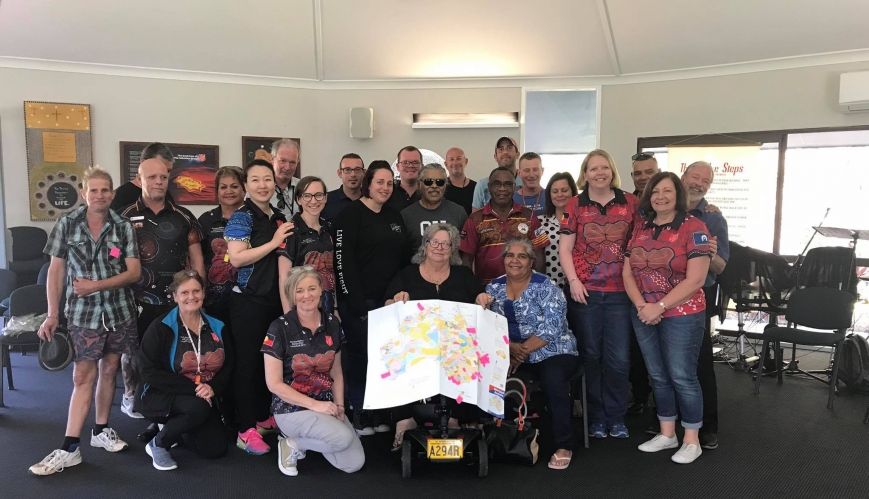
Cultural immersion training for cadets a life-changing experience - Part 2
18 October 2018
The cadets in Brisbane spent time at Gold Coast Recovery Services (Fairhaven), learning about addiction and sharing chapel with the residents.
Continued from
A week of Indigenous cultural immersion training for all Australian Salvation Army cadets took place from 29 September to 7 October. The cadets were divided into groups and sent to four different locations: Brisbane, Katherine, Melbourne
Sydney
The cadets were based at the Eva Burrows Training College at Bexley North and also spent time in the inner-city suburb of Redfern touring politically important sites with Aunty Donna Ingram; experienced a fully commentated cruise on the Tribal Warrior, which included an educational tour on Be-land-le-wool (Clark Island) and a cultural performance.
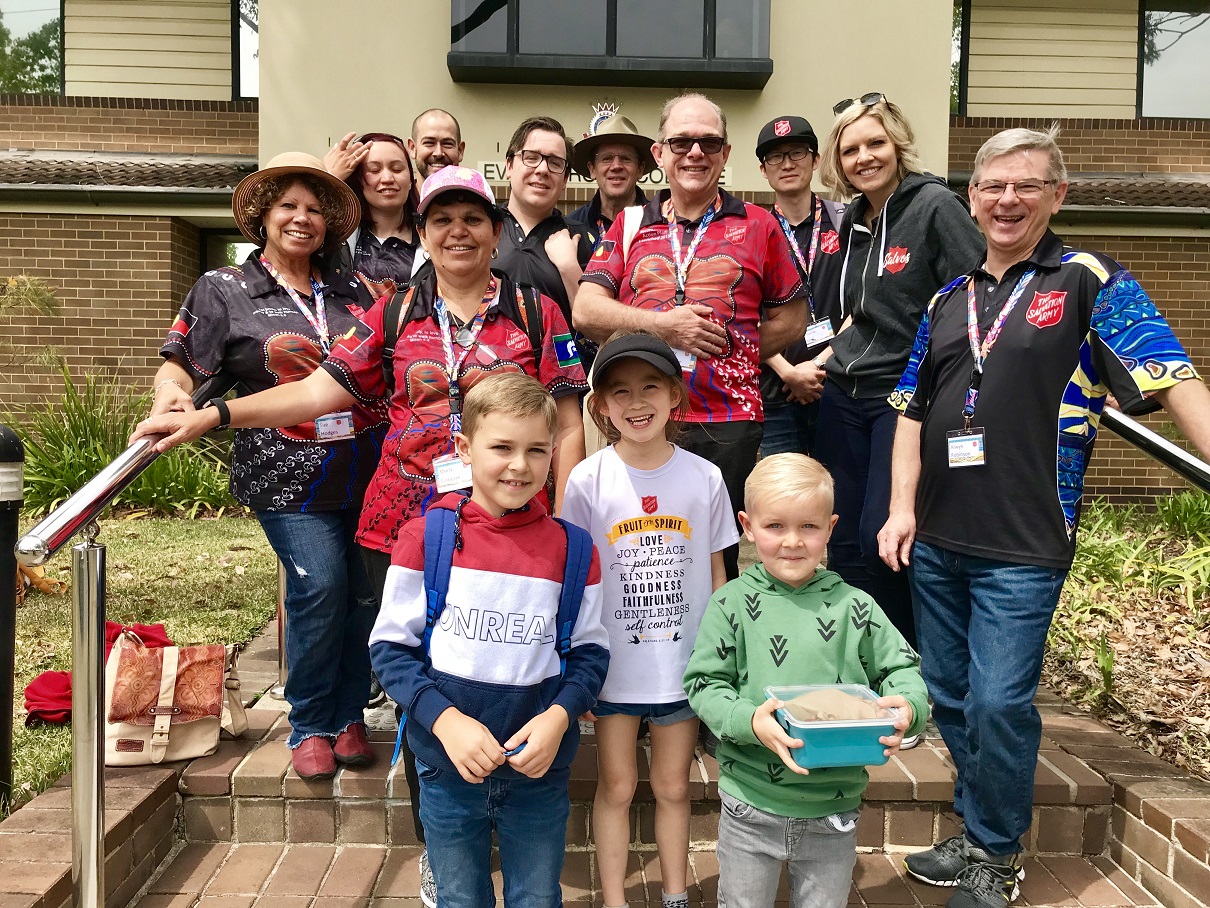 Cadets in Sydney were immersed in Aboriginal and Torres Strait Islander culture.
Cadets in Sydney were immersed in Aboriginal and Torres Strait Islander culture.
“On Friday, Aunty Adelaide, Reverent Uncle Matt Patterson and Aunty Theresa walked us through some very interesting eye-opening, raw cultural knowledge about the past practices of Australian governments and treatment of our Aboriginal and Torres Strait Islander peoples,” said Sue.
The cadets also spent time with Aunty Sharon and Uncle Ray Minniecon, Uncle Col Watego Jnr and their little congregation at Grass Tree Church, and participated in yarning, art, basket weaving,
“The cadets allowed themselves with open hearts and minds to be immersed in Aboriginal and Torres Strait Islander culture,” said Sue.
“All gained new knowledge and skills with the use of the Australians Together series (LINK), guest speakers, site tours and individual discussions with Shirli Congoo and myself.”
Katherine
“What we discovered was a very intelligent, gentle and embracing community,” said Clayton Spence – Learning Support – First Five Years (Lieutenants) Auxiliary Lieutenants at the School For Officer Training – Eva Burrows College, who accompanied the cadets to Katherine.
Clayton shared that everyone learned things about Australia’s first peoples, and their cultures, that couldn’t be learned by doing a course or reading a book.
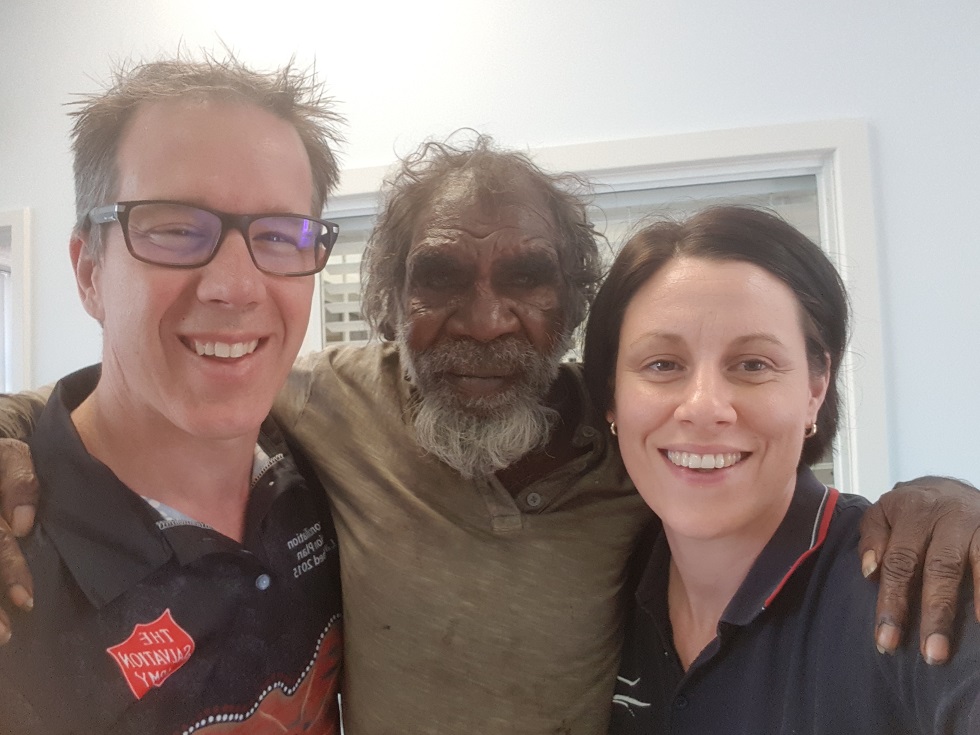 Cadets Scott and Natalie Frame spent time with Sambo in Katherine.
Cadets Scott and Natalie Frame spent time with Sambo in Katherine.
“Just being able to sit with people, particularly the elders, hearing their stories and perspectives and understanding their different
Cadet Scott Frame was also profoundly impacted by the Indigenous immersion training.
“The visit of our team to Katherine in the Northern Territory was a truly life-changing experience for all involved,” he said. “The beauty of the landscape, the rich heritage of the people we encountered, and our season of serving the community with the love of Christ were all integral elements of the incredible opportunity we were so privileged to enjoy over these days.
“This trip undoubtedly affected each member of our cohort profoundly, underlining the need for us each to be radically committed to building loving and respectful relationships with the indigenous people of our nation.
“The journey stretches out before each one of us, while the experiences of our week spent in the heart of our nation
“We praise God for his sovereign hand in leading us to Katherine as partners in his work there, and we look forward to grasping hold of the opportunity that is ours to work for lasting peace and justice for all Australians in our ongoing ministry roles across our nation.”
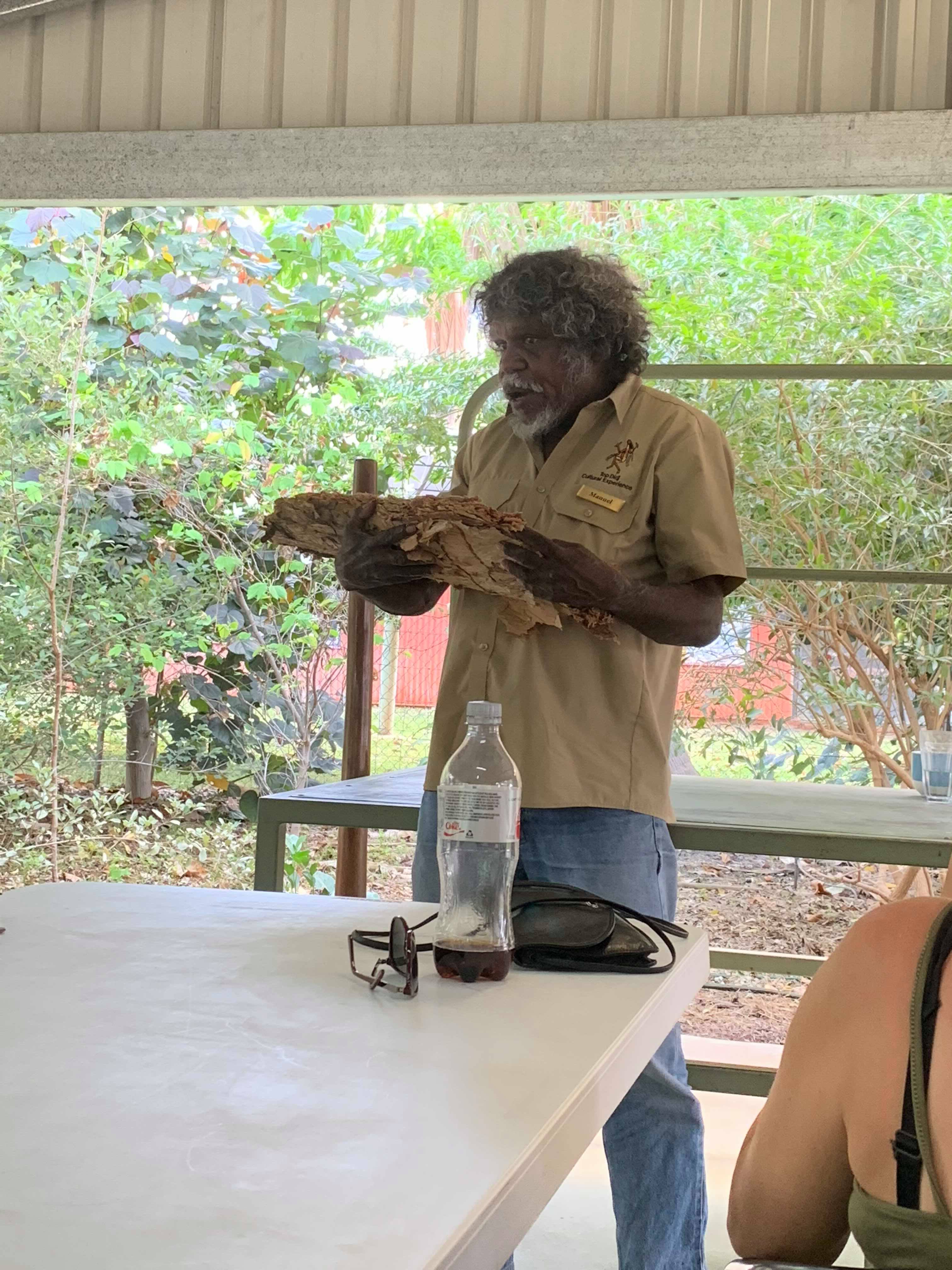 Manuel passes local knowledge and skills to the cadets.
Manuel passes local knowledge and skills to the cadets.
Cadet Stephanie Savage said it was an absolute privilege to spend the week in Katherine and to be immersed in Australia’s Indigenous culture.
“The Aboriginal people we spent time with were such humble, quiet, and deeply spiritual people who can teach us so much about values, respect, sharing of resources, caring for each other, the importance of family and sharing knowledge and stories with younger generations,” she said.
“I have discovered a beautiful culture that I can learn so much from. Yes, it is different from my own culture and that’s okay. But the sooner we learn to live alongside each other in our differences and respect and celebrate one another’s diversity, the better. That would look like the Kingdom of God. Hallelujah!”
Sally Stevens,
“I think that the biggest thing for me was sitting alongside,” she shared. “There were many opportunities for me to share a coffee, and to be led in conversation by some beautiful indigenous ladies – slowly, and quietly.
“The more comfortable I felt sitting, the more I felt trusted with conversations. And I felt really
“We were afforded the incredible privilege of this many times, too, throughout everything we were involved with.”
Melbourne
Major Sandra McLean Crowden, Social Justice Secretary based in Melbourne, gave an overview of Indigenous culture to the group before testing their knowledge with a fun and interactive quiz.
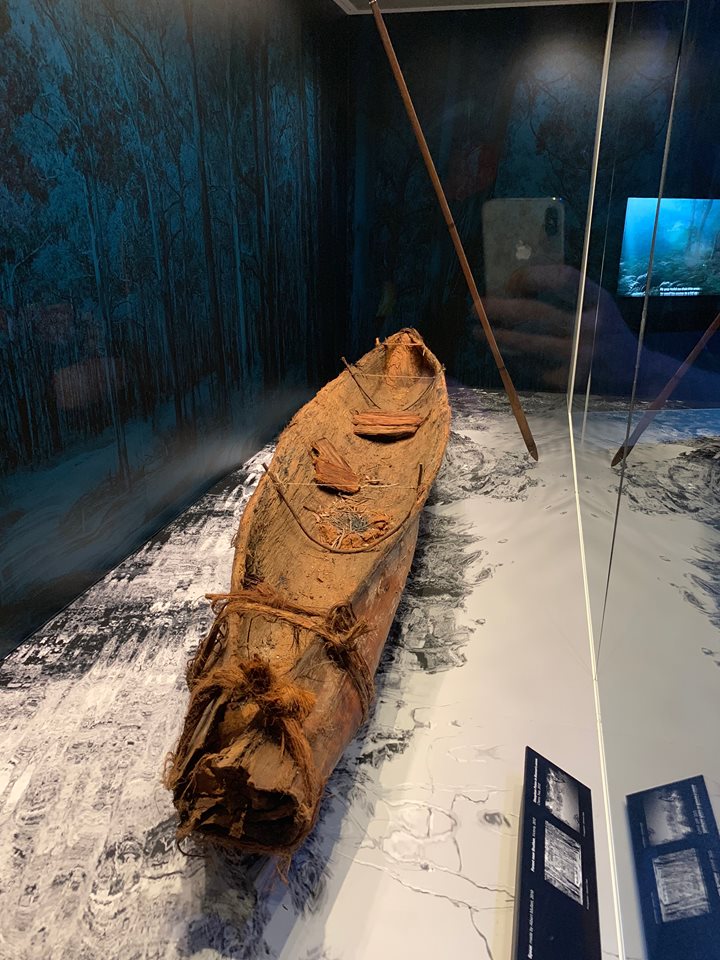 Cadets learned about Indigenous
Cadets learned about Indigenous
“Over the course of the week, we also watched the Indigenous documentary series, Australians Together, which supplemented our learning,” said Cadet Min-Hwan Oh.
The cadets spent a day at Whitley College, attending the Aboriginal and Torres Strait Islander Spirituality Symposium where established and emerging Aboriginal and Torres Strait Islander theologians presented on what The Dreaming and spirituality
The cadets also participated in an Aboriginal ceremony and the expression of respect for each other and creation during the symposium; spent time at the William Ricketts sanctuary in Mt Dandenong, where Ricketts’ artistic works throughout the grounds depict his feelings on the takeover and devastation inflicted by Westerners on the natural environment.
A visit to the Bunjilaka Aboriginal Culture Centre at Melbourne Museum introduced the group to the First Peoples of Victoria exhibit, which displayed local knowledge, skills
“We were then given the opportunity to reflect on the changes that occurred to these practices after the arrival of Europeans, which gave us a better understanding of the diversity and longevity of Australia’s first
“We would do well to listen with respect and humility, reducing our own voices that we may listen to theirs.
“As we commit ourselves to
Second-year cadet, Mitchell Stevens, was also impacted by the immersion training.
“Becoming aware of the Indigenous perspective of Christ was a new and challenging thought,” he said.
“Indigenous people were forced to leave their culture to follow Christ, however, it is good to know that in the past few decades there have been people looking at how the aboriginal culture and Christianity come together.”
Brisbane
The Gubbi Gubbi/ Jinibara cultural experience for the cadets in Brisbane, with Uncle Noel, included a welcome and smoking ceremony, a corroboree and traditional dance workshops, learning about bush tucker, viewing the making of Aboriginal
.jpg) Cadets joined in yarning circles in Brisbane.
Cadets joined in yarning circles in Brisbane.
Cadet Marika Wallis was impacted by the “journey” that the group experienced.
“We discovered more about the indigenous people, their past, their culture and the issues that they face today,” she said.
“In this
Captain Brenda Young, Coordinator of Personal and Spiritual Formation, School for Officer Training, who accompanied the cadets, said that the immersion training has changed her perspective.
“When you come face to face with another person and you learn their name and hear their story, it changes you. Understanding, grace, compassion and a hunger for justice rise up in the face of people who tell you how the past has hurt and damaged their very souls, and how the present continues to
“I think differently now, I feel differently now and I want to act differently now.”
Comments
No comments yet - be the first.